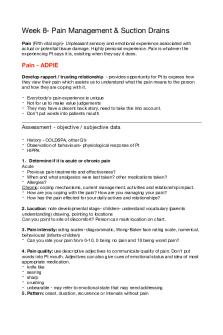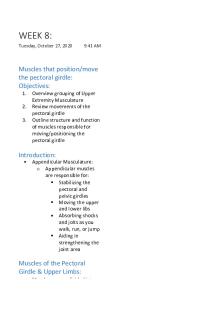Black Music - Week 8 - Lecture Notes PDF

| Title | Black Music - Week 8 - Lecture Notes |
|---|---|
| Author | Josh Andrews |
| Course | Rhythm and Blues, Soul, Funk and Rap |
| Institution | York University |
| Pages | 4 |
| File Size | 71.6 KB |
| File Type | |
| Total Downloads | 99 |
| Total Views | 155 |
Summary
Lecture Notes...
Description
11/5/14 Rhythm & Blues, Soul, Funk and Rap - FA/MUSI 1520 Week 8
Doo Wop; Timeline:
1956-1964
History: Doo Wop was one of the most popular genres of rock & roll ad R&B in the late 50s. Doo wop artists were vocal groups, with each singer in the group taking a different path that interweaved with the other singers. Frequently, the backing vocalists sang nonsense words as rhythm, and the genre’s name derives from this trait. Most doo wop groups started as a cappella bands, performing without instrumental accompaniment. The hit doo wop singles inspired countless teenagers to form their own a cappella groups, though many of them were never recorded. Despite its a cappella origins, few doo wop records were made without instrumental backing. Doo wop faded aways in the early 60s, though its influence was felt throughout popular music in the following decades. • it was a high art; men wore tuxedos or suits, women wore evening gowns • there were dance moves throughout the performances. • in the 50s there was an explosion of doo wop (around 20,000 groups appeared at the height); a lot of young kids got involved with the art because you need not be a music virtuoso to get the sound down. The Penguins: • Managed by Buck Ram - created the first “franchise group” by making it easy to just replace a member of the band; wrote songs for the group as well. • Responsible for the song “Earth Angel (Will You Be Mine)” one of the best-selling, most beloved oldies of all time. • They were the first group to have a massive doo wop hit. • Lead singer Cleve Duncan has kept The Penguins going as a viable outfit for the past 45 years. • Making good money; salary ($100/month) • Playing to 10,000-20,000 people weekly • Selling top-ten records, bringing in a lot of money. The Platters: • Also managed by Buck Ram • He packages The Platters with The Penguins and got Mercury Records to sign both groups. • Within a few years, The Platters eclipsed The Penguins selling 80 million records making them one of the best selling doo wop groups of all time.
• Hits like: “Only You” “Smoke Gets in Your Eyes” “My Prayer” “The Great Pretender” (their breakout #1 hit) and “The Magic Touch” • Doo Wop co-existed with Elvis in the mid-50s The Coasters: • Like most doo wop groups, The Coasters started to fall off after 1962 • They introduced Leiber & Stoller - musicians that wrote songs for Elvis, The Coasters and other groups of the time. • Their engaging and infectious combination made them one of the most popular early R&B groups • “Yakety Yak” was their first big hit. Aimed at the 10-13 year old demographic. • It was a style of song that other recording artists of the time would not have been able to record - try to imagine Nat King Cole singing this song. • “Charlie Brown” another non-sensical silly hit for The Coasters. This brought out the kids, and created a whole new focus for the music business.
Frankie Lymon and the Teenagers: • Frankie himself was only 13 years old when the group had their first hit single “Why Do Fools Fall in Love” • Early inspiration for Little Stevie Wonder and Michael Jackson • They performed for Morris Levy - a drug dealer, who entered the record business and he signed them to a record deal. • Frankie changed doo wop. He didn’t perform in a line. He’d generally start behind the line, and then snake his way around to the other side of the line. He redefined what performance was. • Frankie Lymon got screwed over by Morris Levy - As publisher, half of the song writing team (he didn’t write the song) and Lymon’s power of attorney got 100% of the royalties from “Why Do Fools Fall in Love” • He didn’t last too long - descent into drugs. Sam Cook(e): • Arguably the most influential singer of his time as well as several decades beyond his time. • Born in Clarksdale Mississippi, moved to Chicago when his father (a reverend) got a church up north. • Was only 19 years old when he joined The Soul Stirrers. His boyish looks helped increase attendance at his performances. • Sam Cook, now Sam Cooke, took his talents to the pop R&B audiences. He was now a sex symbol, with his smooth crooning style and perfect diction. • He was thrown out of The Soul Stirrers for singing “The Devil’s Music” • He set the trend for other young gospel singers, Bobby Womack and Aretha Franklin, to try their talents outside of the church. • Signed with RCA, but also had his own record label. In addition to that, he has his own publishing company. So he is getting all of the money from these songs.
• “You Send Me” was his first big hit outside of the church. A big record. • At RCA he puts out another huge hit “Chain Gang” • There is a myth that Sam Cooke created soul music, but that’s inaccurate because Ray Charles already had a few hits by the time Sam released his first record. • Sam was a womanizer - Dec 11, 1964 he is out to dinner, meets a woman named Elisa Boyer. They drive to east LA and the Hacienda Motel. They check in under the names Mr. & Mrs. Sam Cooke. • Bertha Franklin, owner of the motel, found him outside at 3am wearing only a sport coat. Elisa Boyer had stolen his clothes and money. She is afraid for her life, so she gets a gun and tells him to leave. He doesn’t so she shoots him. Twice. Sam is now dead. Once she learned who he is, she decided to sue his family/estate for 1/4 million dollars. And she won. • Sam’s widow, never a fan of the music business, sold the entire empire for $300,000 to Polygram. If she’d kept it, she would have made millions over the course of years. • One of the best Civil Rights movement songs was the Sam Cooke hit “A Change is Gonna Come”
Jackie Wilson: • Also from Mississippi, but didn’t move to Chicago • Dropped out of school in grade 9. • Tried to be a boxer - that didn’t work • Tried his hand at singing. • Joined The Dominoes • Signed with Brunswick at age 23. They were never able to settle on a style for Wilson. He crossed back and forth between R&B and Doo Wop. Jackie favored the latter where he could use his truly astonishing range to good effect. • He meets Berry Gordy (not yet the music impresario he would become) • His fans believed that he was incapable of making a bad record. • His performing style very heavily influenced James Brown and Michael Jackson. • Jackie Wilson was a ladies man - very very much a ladies man. • In the end he had nine kids with about six different women • Jackie Wilson is dating two different women (despite the fact that he is married) and at one point was dating Sam Cooke’s ex-girlfriends. Juanita Jones was upset, because instead of seeing her on Valentine’s day, he was with Harlene Harris. Juanita finds the two of them together, so she shoots Jackie. Twice. The record company, trying to avoid a scandal, concocts a story about Juanita trying to kill herself, and Jackie intervened, getting shot in the process. • IRS issues; Jackie hadn’t filed a tax return for several years. His manager Nat Tarnopol told the IRS that while he might be his power of attorney, Jackie prepared his own taxes and it has nothing to do with him. • Through the process, Jackie found out that he was actually in the mob. His manager was an underling of Gaetano ‘Tommy’ Vastola. A mob boss. • When Jackie asked to be released from his contract, his own bodyguard took him by the ankle and held him out of his office window, nine stories above Broadway. When Tommy asked him if he’d like out of his contract now, Jackie of course said “No”.
• His wife leaves him, he declares bankruptcy. He marries again - Harlene Harris. She divorces him and again he is hit with another large settlement deal. He can’t get out from under the crushing financial burdens. • Post-64 Jackie Wilson is struggling to recapture his career. • He falls hard into drugs and alcoholism. • He has his last big hit “Your Love Keeps Lifting Me Higher & Higher” 1967 • He spent the rest of the 60s and most of the 70s boozed up trying to make a come back. • He suffered a stroke and collapsed on stage in Cherry Hill New Jersey in September 1975. It put him in a coma. For almost ten years. • In 1984 they pulled the plug, and he died of pneumonia. • Nobody came to claim the body, and he ended up getting buried in an unmarked grave in Detroit. Participation Assignment: Questions: In regards t the style of soul music, which incorporated gospel music with secular lyrics, make a case FOR or AGAINST what Ray Charles did. 1. 2. 3. 4.
Is it justified or not for him to take gospel music and turn the songs into secular songs? Explain whether it was right or wrong. What motivated Ray Charles to experiment with so many genres of music? Was Ray Charles responsible for Margie Hendrix’s early death? Why/Why not? Use one word to describe Ray Charles and explain why....
Similar Free PDFs

Week 8 - Lecture notes 8
- 6 Pages

Week 8 - Lecture notes 8
- 23 Pages

WEEK 8 - Lecture notes 8
- 10 Pages

Week 8 - Lecture notes
- 3 Pages

4 - Lecture notes Week 8
- 2 Pages

GBCM Week 8 - Lecture notes 8
- 8 Pages

Week 8, Part 2 - Lecture notes 8
- 5 Pages

Music - Lecture notes all
- 7 Pages

Week 8 Lecture
- 51 Pages
Popular Institutions
- Tinajero National High School - Annex
- Politeknik Caltex Riau
- Yokohama City University
- SGT University
- University of Al-Qadisiyah
- Divine Word College of Vigan
- Techniek College Rotterdam
- Universidade de Santiago
- Universiti Teknologi MARA Cawangan Johor Kampus Pasir Gudang
- Poltekkes Kemenkes Yogyakarta
- Baguio City National High School
- Colegio san marcos
- preparatoria uno
- Centro de Bachillerato Tecnológico Industrial y de Servicios No. 107
- Dalian Maritime University
- Quang Trung Secondary School
- Colegio Tecnológico en Informática
- Corporación Regional de Educación Superior
- Grupo CEDVA
- Dar Al Uloom University
- Centro de Estudios Preuniversitarios de la Universidad Nacional de Ingeniería
- 上智大学
- Aakash International School, Nuna Majara
- San Felipe Neri Catholic School
- Kang Chiao International School - New Taipei City
- Misamis Occidental National High School
- Institución Educativa Escuela Normal Juan Ladrilleros
- Kolehiyo ng Pantukan
- Batanes State College
- Instituto Continental
- Sekolah Menengah Kejuruan Kesehatan Kaltara (Tarakan)
- Colegio de La Inmaculada Concepcion - Cebu






